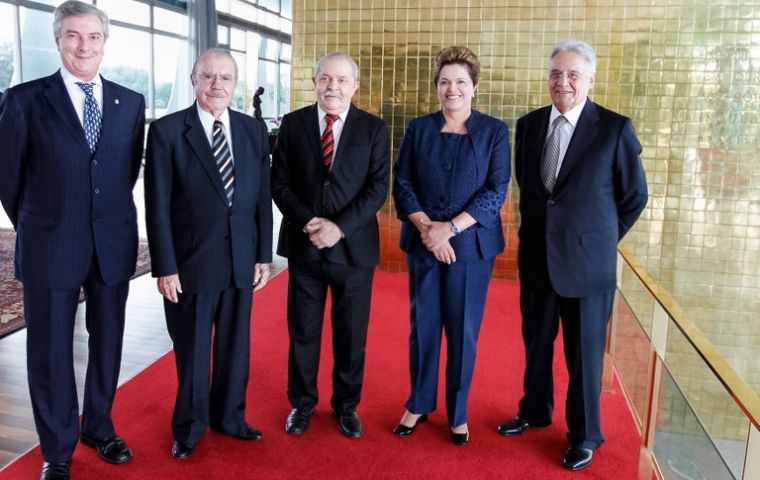MercoPress. South Atlantic News Agency
Rousseff empowers Truth commission to look into the past without hatred or vengeance
 All Brazilian living presidents were present at the solemn ceremony
All Brazilian living presidents were present at the solemn ceremony In a solemn ceremony Brazilian President Dilma Rousseff has sworn in the seven members of a Truth commission created to look into human rights abuses committed during the nation’s long dictatorship.
“Brazil needs the truth; the new generations need to know the truth, and above all deserve to know the truth of events in which they lost friends and relatives and who continue to suffer as if their beloved died again every day”, said president Rousseff during a brief emotional speech on Wednesday.
The Brazilian president guaranteed that the commission will act not moved by “hatred” or “revenge” in its investigations of abuses committed by military regimes in the period extending from 1946 to 1988, but mainly during the last dictatorship, 1964/1985.
All Brazilian living presidents since the end of the military dictatorship were present at the solemn ceremony at the presidential palace: her political mentor Lula da Silva (2002/2010); Henrique Fernando Cardoso (1995/2002); Fernando Collor de Mello (1990/1992) and Jose Sarney (1985/1990) who is currently president of the Senate.
The seven members of the commission have two years to investigate the forced disappearance of individuals and human rights abuses, but on condition of respecting the 1979 amnesty law which impedes taking to court or imprisoning repressors, a law from the time of the military regime but which was ratified by the Supreme Court in democracy.
The UN High Commissioner for Human Rights Navi Pillay said at the ceremony the truth commission is “a necessary step, and much awaited in the process of clearing the past”. However Ms Pillay who is against the 1979 amnesty law but openly supported the creation of the commission back in 2009 when it was first considered.
Some former jail mates of President Rousseff who as a student leader in the late sixties and early seventies was imprisoned and tortured by the military regime were invited to the ceremony, as well as next of kin of the dictatorship victims.
The commission however has been born with disagreements over the scope of the investigation. Commission members say the investigation will focus only on abuses committed by the armed forces during the 1964-85 period, but Junta but retired military officers say it must also look into violations committed by leftist guerrillas who opposed the regime.
Retired officers often express the opinion of the armed forces since military personnel are prohibited by law from doing so publicly. The commission will not prosecute anyone because of a 1979 amnesty law but can reveal the abuses and the names of those who committed them.
In 2010 the Inter American Human Rights Commission declared with no “legal effects” the Brazilian amnesty law and some prosecutors are attempting to press charges against former repressors, but the Supreme Court has repeatedly insisted on its validity.
The bill creating the Truth Commission was first presented by President Lula da Silva but it immediately triggered a strong reaction from the military and then Defense minister Nelson Jobim (who was also a former member of the Supreme Court).
Lula da Silva and the military finally agreed that the commission could investigate a much longer period that the 21 years of the military regime and even look into actions committed by political dissidents and not only State repression.
“I believe the object of the commission is to investigate those crimes committed by the State” said former president Cardoso, as seems to be the prevailing opinion among the members of the Truth Commission.
Brazil officially admits 400 deaths and disappeared during the military regime compared to the alleged 30.000 in Argentina according to human rights organizations and 9.000 by former head of the military Junta Jorge Videla in a recent confession, and over 3.200 in Chile.
Latinamerican Southern Cone dictatorships can be recorded as follows: Paraguay (1954/1989); Brazil (1964/1985); Uruguay (1973/1985); Chile (1973/1990) and Argentina (1966/1973 and 1976/1983). In all these countries with the exception of Brazil there are ongoing trials against military and police personnel allegedly involved in killings, torture and overall human rights abuses.
The Truth Commission is made up of Magistrate Gilson Dipp; former Justice Minister Jose Carlos Dias; lawyers Rosa Maria Cardoso da Cunha, who defended student leader Rousseff during the dictatorship and Jose Paulo Cavalcanti Filho, former prosecutor Claudio Fontelles, sociologist Paulo Sergio Pinheiro and psychologist Maria Rita Kehl.




Top Comments
Disclaimer & comment rules-

-

-

Read all commentsJose Sarney seems a pretty aged ,seems tired !
May 16th, 2012 - 09:29 pm 0A thought that I had when looking at that picture -- not even one of those smiling, 'democratic' presidents did as good to Brazil as did the military leaders they're vilifying.
May 17th, 2012 - 09:55 am 0And will this 'Truth' include the role of the present President in the murder of an American Military Officer in front of his wife and children by the 'terrorist' cell that Rousseff was in charge of?
May 17th, 2012 - 02:55 pm 0Notice I have NOT accused the President of murder.
Commenting for this story is now closed.
If you have a Facebook account, become a fan and comment on our Facebook Page!